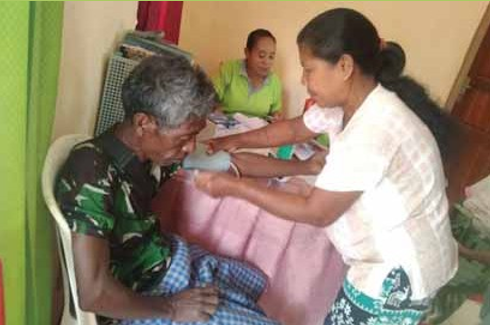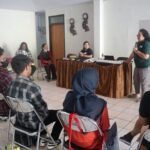


Beyond the Numbers: Evaluating Impact and Effectivities in the Integrated HIV Control Initiatives
September 18, 2024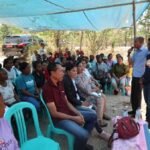


Encounter Leads to Caring
February 27, 2025Posyandu Services:
Between Ideality and Reality
Pos Pelayanan Terpadu (Posyandu), or Integrated Service Post, has become a reliable community-based health service in various situations. Posyandu is the front line in maintaining maternal and child health during Indonesia's economic crises. After a natural disaster in a region, Posyandu can immediately function, even though it is carried out in emergency tents. Similarly, during the post-COVID-19 pandemic, which had stopped due to restrictions on community activities, Posyandu became a health service at the village level that could resume immediately. Posyandu was formed from the community's resources and operated independently by involving health cadres who departed from the spirit of volunteerism.
The Law Number 17 of 2023 regarding Health has just been passed by The House of Representatives of the Republic of Indonesia and enacted by the Indonesian government, replacing the Law of the Republic of Indonesia Number 36 of 2009. Article 32 in paragraph 1 of the new Health Law states that primary health care is provided through coordinated and cooperative health service network systems. Paragraph 2 also states that the Public Health Centre (Puskesmas) coordinates its working area's primary health care network system. Based on these provisions, the structure of the health service network is designed down to the village level, including primary health care facilities, health service units at the village level, and community-based health efforts. Health service units at the village level are mentioned, at least implemented by health cadres assigned by the village and health workers. This provision of a health service network structure up to the village level brings opportunities to strengthen Posyandu, whichever is run by health cadres and health workers who serve and live in the village. However, the knowledge and skills enhancement of health cadres evenly to meet service standards cannot yet apply to remote villages far from district/city centers.
Community-based primary health care is implemented through Posyandu's activities. As a primary health service driven by the community, Posyandu assistance can be provided by the Health Office through puskesmas. Still, Posyandu is located within the village and is under the administrative authority of the Village Government. Therefore, the Ministry of Health seeks to improve primary care by developing an auxiliary health center or Puskesmas pembantu (Pustu) that integrates Pustu's health services at the village level. The center was created by the Health Office and Posyandu and was established by the village. Pustu services are directed to provide health services for all human life cycle targets and strengthen the community empowerment role in the town's health sector. Pustu, as a village health service unit, supports village community empowerment with a service concept both inside and outside the building. Services inside the building are pursued by providing facilities and infrastructure according to standards. Meanwhile, community empowerment activities are carried out by providing space for cadres activities in planning and community empowerment, Posyandu's cadres management, and home visits.
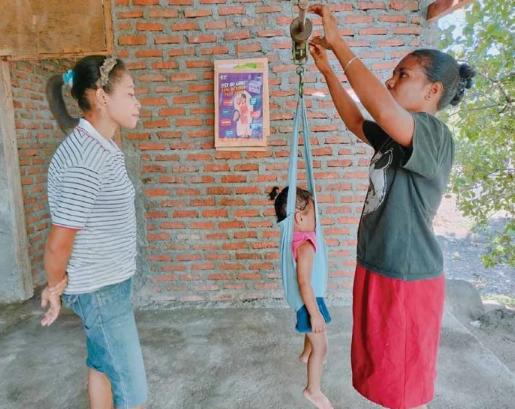

Weighting Toddlers is One of Posyandu’s Activities.
Posyandu's position is strategic because the Village Government and the community initiated it to implement health service programs at the village level. The strategic role of Posyandu is then chosen to run health services at the village level with a human life cycle approach. Through the Decree of the Minister of Health, number 2015 of 2023 concerning Technical Guidelines for the Integration of Primary Health Services, Posyandu that serves the entire human life cycle is carried out based on programs, namely Posyandu for Maternal and Child Health, Posyandu for youth, Posbindu for Non-Communicable Diseases, and Posyandu for elderly.
What is Posyandu?
Posyandu is one form of community-based health effort managed and organized to empower the community and provide convenience in obtaining essential health services to accelerate the reduction of maternal and infant mortality. The existence of Posyandu is vital to bringing promotive and preventive efforts closer to the community, especially related to efforts to improve the nutritional status of the community and maternal and child health attempts. Although established based on community needs and managed by, from, for, and with the community, the role and support of Puskesmas staff and other related institutions are vital in facilitating the implementation of various health activities in Posyandu.
Posyandu activities began in 1975 when the Ministry of Health established the Village Community Health Development policy. This policy implemented the health development strategy with cooperation and community self-help principles. The goal was for the community to help themselves by recognizing and solving environmental health problems. These activities were carried out with health workers in a cross-program and cross-sectoral manner. Some Village Community Health Development activities include nutrition improvement efforts through Karang Balita, diarrhea prevention through the Diarrhea Management Post, community treatment through the Health Post, immunization and family planning through the Immunization Post, and family planning Village Post.
The existence of Village Community Health Development is quite beneficial for the community because it provides convenience for people who need health services. Still, it also fragments health services, complicates coordination, and requires more resources. Therefore, in 1984, the government made a policy through a Joint Instruction of the Minister of Health, the Head of the National Family Planning Coordinating Board, and the Minister of Home Affairs that integrated various activities in the community into one entity called Posyandu. The activities are directed to further accelerate the reduction of maternal and infant mortality rates, following the concept of GOBI-3F (Growth Monitoring, Oral Rehydration, Breast Feeding, immunization, Female Education, Family Planning, and Food Supplementation), which is translated into 5 Posyandu activities, namely Maternal and Child Health, family planning, immunization, nutrition, and diarrhea management.
Through the Instruction of the Minister of Home Affairs No. 9 of 1990 regarding the Improvement of Posyandu Quality Management, all regional heads were assigned to improve Posyandu's quality management. A Posyandu Operational Working Group manages Posyandu management, which is a shared responsibility between the community and the local government. As a result, Posyandu increased massively as villages or sub-districts established them.
In its development, Posyandu provides health and nutrition services and synergizes various services the community needs, such as education and child development, family economic improvement, family food security, and social welfare. This is due to the flexible nature of the establishment, which is developed according to the needs, problems, and capabilities of the community’s resources.
According to data from the Ministry of Health in 2018, the number of Posyandu in Indonesia reached 283,370, with 173,750 or about 61.32% being active Posyandu. The criteria for an active Posyandu include the following:
- Conducting routine Posyandu activities at least ten times per year.
- Having at least five cadres.
- Service coverage of Maternal and Child Health, nutrition, immunization, and family planning activities with at least 50%.
- Having a growth monitoring tool.
- Having at least one health development activity (youth, working age, elderly, family medicinal plants, disease prevention).
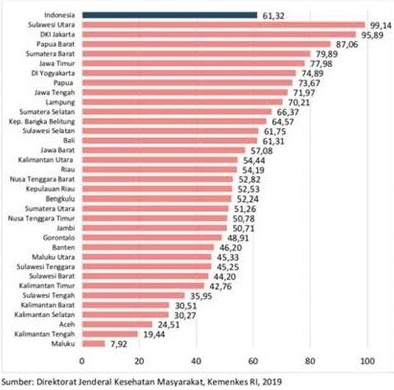

Diagram of Percentage of Active Posyandu per Province in Indonesia in 2018
Posyandu Ideal Service
The establishment of Posyandu was based on the village government's and the community's initiative, which was then established through village regulations. Posyandu is usually located at the sub-village level with cadres who meet specific criteria. Posyandu management members are selected from the local community and consist of the Chairman, Secretary, Treasurer, Health Division, and other fields as needed. Posyandu management is usually set for a 5-year term and can serve a maximum of 2 terms. Furthermore, Posyandu is required to have a place in the form of a building as well as infrastructure and equipment to support services.
The Posyandu services are conducted to monitor the health status of infants and toddlers, assess child growth and development, distribute Vitamin A capsules twice a year in February and August, provide complete immunizations, detect early signs of growth disorders in weight and height/length as a preventive measure against malnutrition and stunting, offer immediate referrals to the nearest Puskesmas, and receive counseling on the health of infants and toddlers. For pregnant, postpartum, and breastfeeding mothers, the Posyandu monitors weight and upper arm circumference, provides Blood Additive Tablets and Tetanus Toxoid immunization (TT) for pregnant women, and offers health education on maternal health (pregnancy planning, nutrition for pregnant and breastfeeding mothers, etc.).
The standard Posyandu services for infants, toddlers, pregnant women, and breastfeeding mothers are pretty simple, comprising five steps: Step 1: Registration, Step 2: Weighing and Measuring, Step 3: Recording, Step 4: Health Counseling, and Step 5: Health Services (immunization, family planning). In Step 1 at Table 1, Posyandu volunteers register the infants/toddlers and pregnant women who are present. In Table 2, volunteers weigh the infants/toddlers and pregnant women and measure pregnant women's upper arm circumference. Next, in Table 3, the weighing results are recorded on the Health Monitoring Card to assess whether weight gain has occurred and to note the measurements of pregnant women. In Table 4, volunteers provide health education, counseling, and supplementary feeding. Health workers who visit provide immunization and family planning services, as shown in Table 5. Health center staff may administer contraceptive injections and offer family planning counseling. IUD and implant insertions can be performed in a suitable room, with equipment and trained personnel. Volunteers can provide family planning services such as distributing condoms and contraceptive pills.
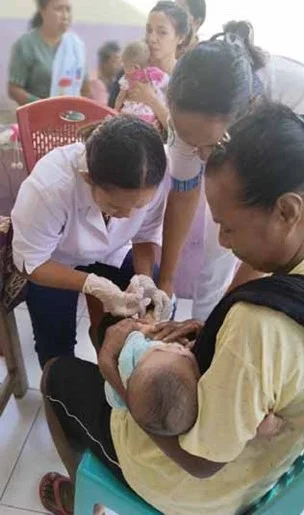

Immunization Service at Posyandu
In addition, to improve pregnant women's health further, health workers organize Pregnant Mother Classes on every Posyandu day or other days as agreed. The Pregnant Women's Class activities include counseling on danger signs in pregnant women, labor preparation, breastfeeding preparation, family planning, and nutrition. There is also information on breast care and breastfeeding, a demonstration of pregnant women's diet, a demonstration of newborn care, and pregnant women's gymnastics. Maternal and Child Health services for infants and toddlers should be done in a fun way that encourages creativity in their growth and development. If the service space is adequate while waiting for the service turn, children under five are allowed to play with fellow toddlers with parental supervision and under the guidance of cadres. Therefore, Posyandu can also provide appropriate game facilities for the toddler's age. The types of services organized by Posyandu for children under five include:
- Weight measurement.
- Determination of growth status.
- Counseling and education.
- Health checks, immunization, and early child growth and development detection by Puskesmas health workers.
Immunization services at Posyandu are only carried out by Puskesmas staff. The type of immunization provided is adjusted to the program for infants and pregnant women.
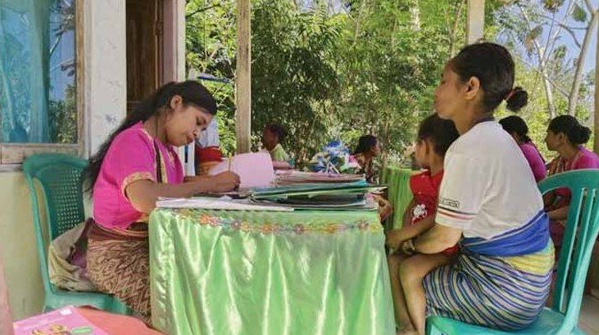

At the Registration Desk, a Cadre is Recording Toddlers who Attend Posyandu.
Cadres conduct nutritional services at Posyandu. These services include weight measurement, early detection of growth disorders, nutritional education and counseling, and supplementary feeding (local supplementary feeding, vitamin A supplementation, and Chronic-energy-deficiency (CED) tablets). If a pregnant woman is found to have CED, or if a toddler's weight does not increase for two consecutive times or falls below the red line, cadres must immediately make a referral to the public health care or village health post.
Diarrhea prevention at Posyandu involves education on Clean and Healthy Life Behaviors. Diarrhea management consists of distributing oral rehydration solution. If further treatment is needed, health workers provide zinc tablets.
Reality
The tasks assigned to Posyandu cadres are pretty burdensome, including being educators, record keepers, mobilizers, and stunting prevention agents. The role of educators involves promoting activities such as educating pregnant women and mothers with infants and toddlers. The role of record keepers involves preventive activities like early detection of growth and developmental disorders in toddlers. At the same time, the mobilizer role involves:
- Promoting health promotion and stunting prevention
- Actively participating in village forums
- Collaborating with other sectors
On the other hand, Posyandu is also burdened with the concept of integrating essential social services, including guidance on nutrition and mother-child health, disease control and environmental health, clean and healthy living behavior, elderly health, Bina Keluarga Balita, Early childhood education post, food consumption diversification acceleration, empowerment of the poor, isolated indigenous communities and those with social welfare problems, youth reproductive health, and family economic improvement.
These various tasks assigned to Posyandu are often not followed by efforts to improve the knowledge and skills of Posyandu cadres, provide adequate service support facilities, and limited incentives for cadres. Additionally, village political situations often affect the existence of Posyandu cadres. Newly elected village heads can easily replace trained Posyandu volunteers due to differences in choices during village head elections. This situation causes some new cadres to be unable to implement Posyandu service standards, such as upper arm circumference measurements, health card recording, health education, and provision of supplementary feeding with local food. Meanwhile, training for Posyandu cadres, which is the responsibility of the Health Office, is not routinely conducted due to insufficient budget constraints to train all Posyandu cadres.
Many villages have already procured and distributed health equipment provided by the Health Office, Village Government, or other supporting institutions. This equipment meets the standards set by the Health Office. It is partly in digital devices like baby and toddler scales, which replace manual scales, blood pressure monitors, and body temperature measuring devices. However, cadres often do not receive training on new digital devices, resulting in errors during Posyandu check-ups.
Program Interventions
CD Bethesda YAKKUM has implemented program interventions to improve the quality of Posyandu services in 30 villages in Alor, Malaka, and East Sumba for approximately two years. Initial efforts included increasing health initiatives and self-sustained social support. During the two years of the program, all partner villages have demonstrated self-sustained health initiatives and social support, such as utilizing local food/nutrition gardens, providing supplementary feeding, developing herbal gardens and production, improving sanitation, managing infectious diseases (TB), and preventing non-communicable diseases.
In particular, community awareness of cultivating local food gardens with vegetables and tubers by individuals and organizations is one of the health efforts associated with Posyandu services. A portion of the produce from these fish ponds and nutrition gardens is given to families whose children are stunted, underweight, or malnourished. Additionally, creating nutrition gardens in their backyards is becoming increasingly popular among families with young children. Additionally, the cadres took the initiative to gather food from the area, create cakes using cassava flour, and prepare a variety of cakes for Posyandu's supplemental feeding program. Individuals with impairments also bake cakes using regional ingredients for toddlers at the Posyandu.
Forms of social support that have emerged from community self-sufficiency to support Posyandu activities include providing supplementary feeding from local food ingredients (moringa, sweet potatoes, pumpkin) for pregnant women with Chronic Energy Deficiency, infants, and toddlers with malnutrition, undernutrition, and stunting. Some parents of infants and toddlers collect contributions through local food (bananas and sweet potatoes) or money during Posyandu activities. These contributions are used to provide supplementary feeding for toddlers. Other forms of support include providing supplementary feeding for toddlers at Posyandu through a contribution system of Rp5,000 for two pieces of cake made from local food ingredients. The money from these contributions is used to purchase ingredients for the following month. Posyandu cadres began using local food (banana biscuits, chicken nuggets, fish floss, and tofu meatballs) in supplementary feeding for underweight, malnourished, and stunted toddlers.
So far, many Village Governments have not prioritized Posyandu as a main program, so the budget allocation has not met community expectations. Therefore, this program compiled the health initiatives and social support into a community action plan proposed for integration into the village development budget. Twenty-nine partner villages have received integrated and funded health initiatives and social support action plans from the village development budget. The village development budget in nine partner villages in the Malaka area that supports health initiatives and social support amounts to approximately Rp1,654,500,000 over two years of the project. Ten villages have integrated community action plans into the village budget in the East Sumba area, with a value of around Rp 913,212,000. In the Alor area, ten partner villages have integrated health initiatives and social support into the village budget, with a value of Rp459,537,964.
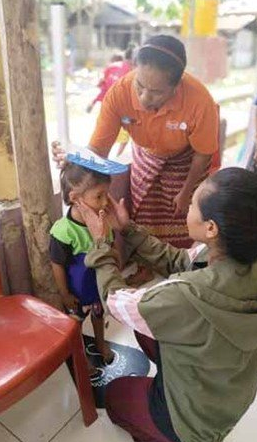

Height Measurement of Toddlers at Posyandu
Integrating health initiatives and social support into village funding has significantly improved the quality of Posyandu services. Some of the village budget allocations that support Posyandu activities include building Posyandu facilities, providing supplementary feeding for toddlers and pregnant women, increasing the number of health workers in the village (nurses, midwives, or nutritionists), Desa Siaga transportation to assist women labor, Posyandu cadres incentives, Posyandu cadres training, purchasing health equipment for Posyandu, procuring furniture for Posyandu facilities, and more.
Posyandu's needs and the activities suggested by the community in the Village Action Plan, such as offering local food-based nutrition, supplying health equipment for Posyandu, increasing the number of health workers in the village, village-level training, building healthy latrines for impoverished families who lack adequate sanitation facilities, and so on, have been mainly met by funding support from 29 of the 30 partner Village Governments. However, when it comes to budgeting and purchasing commodities, there is a lack of coordination between the Health Office, Puskesmas, and Village Governments about planning expenditures for Posyandu facilities and allocating budgets for training.
Strategic Role of Posyandu in the Future
The government’s policy focusing on the transformation of Primary Health Services with a life cycle approach, as well as a focus on strengthening promotion and prevention, has significant implications for the future strategic role of Posyandu. The Health Department will carry out efforts to enhance the promotion and prevention of health services through networks extending to the village and hamlet levels. One critical health system reform strategy initiated by the Ministry of National Development Planning of the Republic of Indonesia includes revitalizing and digitalizing Posyandu and activating health cadres. Here, Posyandu and Puskesmas once again become the mainstay. However, one crucial requirement that needs attention is prioritizing the health budget for promotive-preventive efforts.
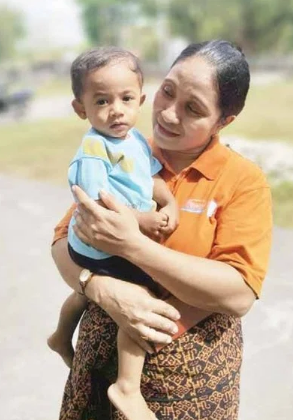

A Mother with a Toddler at One of the Posyandu
The life cycle approach in Posyandu services follows integrated health services for pregnant women, toddlers, adolescents, adults, and the elderly. Posyandu services, particularly for promotive and preventive activities, include education, early detection, rapid tests, immunization, and supplementary feeding.
Organizing Posyandu with a life cycle approach is essential to make primary health services at the village level more holistic and not partial. Posyandu services, according to the human life cycle, from the child in the womb and mothers in labor to adolescents and the elderly, are expected to bring essential health services closer to the community.
(Sukendri Siswanto)


